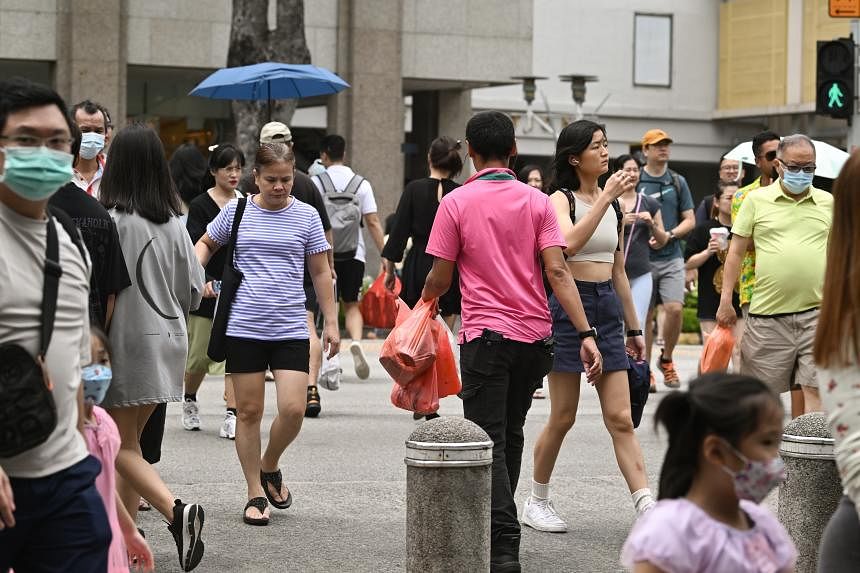
SINGAPORE – There was a spike in the number of Covid-19 infections here in the week of Sept 17 to 23. The 14,843 people diagnosed with the disease are more than double those in the previous week, when 6,401 cases were recorded.
In the previous 10 weeks, between July 9 and Sept 16, the number of infections each week ranged from 3,485 to 7,045.
Singapore no longer requires reporting of Covid-19 cases, so these numbers generally reflect those who sought medical care.
The Ministry of Health (MOH) said it is monitoring the situation, but does not think there is a need to worry as the number of people infected “is currently low compared to previous waves”.
“The average daily new Covid-19 hospitalisations and average daily new ICU (intensive care unit) cases have also remained low,” it said about the current spike in cases on its Covid-19 website.
The peak number of infections this year was 28,410 a week at the end of March. That week, 159 people were hospitalised, a slight increase over the 139 in the previous week; and seven needed to be admitted to intensive care, up from six in the previous week.
However, hospitalisation and the need for intensive care usually lag infections. The infection peak at the end of March had led to a higher number of hospitalisations and admissions to the ICU in April.
April and May also recorded the highest number of Covid-19 deaths in 2023 – 54 and 53, respectively.
In August, 10 people, all at least 60 years old, died of Covid-19 here. This is MOH’s latest Covid-19 deaths figure on its website.
The MOH statement added: “The increase could be due to a number of factors, including waning population immunity, rise of other emerging variants and increased travel and community interactions, resulting in virus transmission.”
The most common variant here currently is the HK.3, which accounts for almost half the infections. This is a sub-variant of EG.5.1, which has been dominant since July. All variants of the Covid-19 virus circulating today are Omicron sub-variants.
Dr Asok Kurup, an infectious diseases expert in private practice, said the increase could be due to more people travelling during the recent school holidays (Sept 2 to 10) and bringing infections back with them.
Singapore also hosted the three-day F1 Singapore Grand Prix races from Sept 15 to 17, which drew a packed crowd of more than 260,000 spectators.
Dr Kurup said these might have led to an undetected surge in cases initially, “but cross transmission to those who are more vulnerable and who tend to seek medical care could perhaps account for the current trend”.
The median time is around five days for a person to show symptoms after exposure to the virus.
MOH urged people to “maintain personal hygiene and keep up to date with their Covid-19 vaccinations, including a booster dose around one year after their last booster dose for those aged 60 years and above, medically vulnerable persons, and residents of aged care facilities”.
Nine in 10 people here have had at least one dose of Covid-19 vaccine, while 81 per cent has achieved what the MOH defines as the minimum protection: three doses of mRNA or Novavax, or four doses of Sinovac vaccines.
Towards the end of October, Singapore expects to receive the new monovalent vaccine targeted at the Omicron sub-variants. The booster shot remains free for residents.
On Sept 15, Health Minister Ong Ye Kung cautioned in a Facebook post that “the virus has not gotten milder, it is we who have gotten stronger, through vaccinations and safe recovery from infections”. But this protection is being eroded by falling vaccine take-up rates.
He urged people here, especially seniors, to get the vaccine once a year.
https://www.straitstimes.com/singapore/covid-19-infections-more-than-double-in-week-of-sept-17-23


